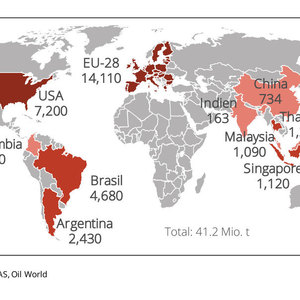EU produces a third of global biomass-based diesel output

December 31, 2019
BY Ron Kotrba
In the EU, biodiesel production has increased for another year, accounting for more than one third of global production, according to a December release by Germany’s UFOP.
Global biodiesel, renewable diesel and coprocessed renewable diesel production reached 41 million metric tons in 2018, or roughly 12.3 billion gallons, according to UFOP. The EU’s share was 34 percent, or approximately 4.2 billion gallons. UFOP points out that, while rapeseed oil is a primary feedstock for European biodiesel production, soybean oil is a primary source in the Americas as a result of excess oil from processing to meet the high demand of soybean meal for animal feed.
The largest biodiesel-producing areas in the world are the EU; Southeast Asia, including Indonesia, Thailand, Singapore and Malaysia; the U.S.; and South America, most notably Brazil and Argentina.
Advertisement
UFOP notes that biodiesel production is growing rapidly in Southeast Asia—particularly in the key palm oil-producing countries such as Indonesia and Malaysia, where a palm oil glut and the related pressure on prices in the vegetable oil markets are driving policies to increase biodiesel production.
“Contrary to the EU, these countries are raising their domestic blending quota requirements to stabilize producer prices and to reduce foreign exchange expenses on oil imports,” the UFOP stated. “For the second time, global output of vegetable oils exceeds the level of 200 million metric tons in the 2019-’20 marketing year.”
Advertisement
Related Stories
Biodiesel capacity in the U.S. and Canada dipped slightly stable in 2024, with several renewable diesel producers reporting headwinds and lower margins alongside a drove of SAF projects in various stages of development.
The IEA’s Task 39 group has new research regarding the development and status of the sustainable aviation fuel industry.
The U.S. EPA on Nov. 16 released updated RIN data, reporting that nearly 2.11 billion RINs were generated under the RFS in October, up from 1.81 billion generated during the same month of last year.
Conestoga to host SAFFiRE cellulosic ethanol pilot plant
Conestoga Energy and SAFFiRE Renewables LLC announced on Nov. 16 their agreement for Conestoga to host SAFFiRE’s cellulosic ethanol pilot plant at Conestoga’s Arkalon Energy ethanol facility in Liberal, Kansas.
Officials at Calumet Specialty Products Partners L.P. discussed the company’s proposed plans to boost sustainable aviation fuel (SAF) production at its Montana Renewables biorefinery during third quarter earnings call, held Nov. 9.
Upcoming Events










